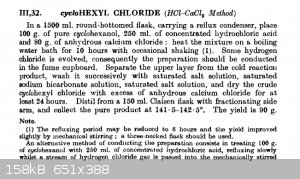SuperOxide
Hazard to Others
  
Posts: 489
Registered: 24-7-2019
Location: Devils Anus
Member Is Offline
|
|
BnCl synthesis - Using anhy. CaCl2 as catalyst?
I've made benzyl chloride a few different ways, with just a vast excess of HCl as well as only a slight excess of HCl with some anhydrous zinc
chloride as a catalyst. I was telling a friend about the synthesis, and he mentioned that maybe even anhydrous calcium chloride could be used either
in place or in addition to the zinc chloride.
I didn't think about it at first, but then I remembered that I actually have concentrated some 20% HCl to >30% by bubbling dry HCl through it, and
the HCl was generated by heating up some other 20% HCl with a lot of anhydrous calcium chloride in it. And from what I understand about using the zinc
chloride as a catalyst, it basically helps push the reaction forward by releasing additional HCl while reacting with the water that's released from
that reaction of BnOH + HCl. Calcium chloride may not release HCl, but it would definitely grab onto the water biproduct.
Has anyone tried using anhydrous calcium chloride in this manner? Is there any reason it wouldn't work?
Thanks.
|
|
|
SplendidAcylation
Hazard to Others
  
Posts: 203
Registered: 28-10-2018
Location: Starving in some deep mystery
Member Is Offline
Mood: No one I think is in my tree.
|
|
I have been wondering about this myself lately!
I think it would work, as it works for similar reactions:
Vogel has a synthesis for cyclohexyl chloride using calcium chloride (see attached image)
And here is an excellent video on the preparation of isopropyl chloride this way; I have tried this, and it worked very well.
So I'm sure it'd work for BnCl too, I'm not exactly sure how it works in these reactions though; Does it act as a dehydrating agent, pushing
the equilibrium forward by removing water by forming hydrates, or does it increase the conc. of chloride ions in solution?
Perhaps it is both of these factors.

[Edited on 10-4-2022 by SplendidAcylation]
|
|
|
SuperOxide
Hazard to Others
  
Posts: 489
Registered: 24-7-2019
Location: Devils Anus
Member Is Offline
|
|
Quote: Originally posted by SplendidAcylation  | I have been wondering about this myself lately!
I think it would work, as it works for similar reactions:
Vogel has a synthesis for cyclohexyl chloride using calcium chloride (see attached image)
And here is an excellent video on the preparation of isopropyl chloride this way; I have tried this, and it worked very well.
So I'm sure it'd work for BnCl too, I'm not exactly sure how it works in these reactions though; Does it act as a dehydrating agent, pushing
the equilibrium forward by removing water by forming hydrates, or does it increase the conc. of chloride ions in solution?
Perhaps it is both of these factors. |
I think its both of these factors. I think by forming the hydrates, it increases the concentration of chloride ions in solution, thus pushing it
forward.
The reason ZnCl2 probably is usually used more often is because not only does it form hydrates, but it also releases HCl when it does. So it doesn't
just free up HCl, but actually adds to it. (Pretty sure about that anyways).
|
|
|
njl
National Hazard
   
Posts: 609
Registered: 26-11-2019
Location: under the sycamore tree
Member Is Offline
Mood: ambivalent
|
|
ZnCl2 is also a Lewis acid which helps with the reaction, while CaCl2 is not.
Reflux condenser?? I barely know her!
|
|
|
clearly_not_atara
International Hazard
    
Posts: 2801
Registered: 3-11-2013
Member Is Offline
Mood: Big
|
|
I think ZnCl2 is used as an example because it's undergraduate pedagogy, not practical engineering, and ZnCl2 is a bit stronger and so works with
primary aliphatic alcohols, while CaCl2 may not, and the goal is to keep it simple, stupid. CaCl2 is definitely easier to work with if you can use it,
and it can be dried and used over and over.
|
|
|
kmno4
International Hazard
    
Posts: 1504
Registered: 1-6-2005
Location: Silly, stupid country
Member Is Offline
Mood: No Mood
|
|
BnCl comes back like a boomerang.....
Read this, for example:
https://www.sciencemadness.org/whisper/viewthread.php?tid=71...
.. and the paper by Clark ( ZnCl2 in chlorides preparations)
Attachment: Clark.pdf (299kB)
This file has been downloaded 344 times
[Edited on 10-4-2022 by kmno4]
Слава Україні !
Героям слава !
|
|
|
unionised
International Hazard
    
Posts: 5129
Registered: 1-11-2003
Location: UK
Member Is Offline
Mood: No Mood
|
|
I'm pretty sure it is.
|
|
|
DraconicAcid
International Hazard
    
Posts: 4364
Registered: 1-2-2013
Location: The tiniest college campus ever....
Member Is Offline
Mood: Semi-victorious.
|
|
Zinc chloride is a much stronger Lewis acid than calcium chloride.
At least, I zinc so.
Please remember: "Filtrate" is not a verb.
Write up your lab reports the way your instructor wants them, not the way your ex-instructor wants them.
|
|
|
SuperOxide
Hazard to Others
  
Posts: 489
Registered: 24-7-2019
Location: Devils Anus
Member Is Offline
|
|
Not sure what you mean here.
|
|
|